RNSG MISC
South Texas College
Page 2 out of 32 results
Sort by
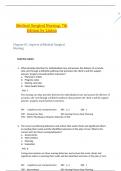
-
TEST BANK FOR MEDICAL SURGICAL NURSING 7TH EDITION,Medical-Surgical Nursing Linton and Basic Pharmacology for Nurses (ALL 1 to 60 CHAPTERS IN ONE BUNDLE) questions with 100% correct answers Download for an A+
- Package deal • 38 items • 2023
-
- $40.49
- 1x sold
- + learn more
TEST BANK FOR MEDICAL SURGICAL NURSING 7TH EDITION,Medical-Surgical Nursing Linton and Basic Pharmacology for Nurses (ALL 1 to 60 CHAPTERS IN ONE BUNDLE) questions with 100% correct answers Download for an A+
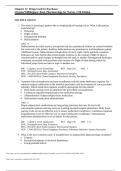
-
Chapter 17: Drugs Used for Psychoses Clayton/Willihnganz: Basic Pharmacology for Nurses, 17th Edition questions with 100% correct answers Download for an A+
- Exam (elaborations) • 7 pages • 2023
- Available in package deal
-
- $8.49
- + learn more
1. The nurse is assessing a patient who is complaining of hearing voices. What is this patient experiencing? a. Delusions b. Flight of ideas c. Disorganized thinking d. Hallucinations ANS: D Hallucinations are false sensory perceptions that are experienced without an external stimulus but seem real to the patient. Auditory hallucinations are prominent in a schizophrenic patient. Additional sensory hallucinations include those of touch, sight, smell, and body sensation. Delusions are fa...
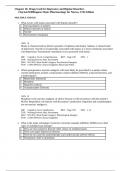
-
Chapter 16: Drugs Used for Depressive and Bipolar Disorders Clayton/Willihnganz: Basic Pharmacology for Nurses, 17th Edition
- Exam (elaborations) • 11 pages • 2023
- Available in package deal
-
- $9.49
- + learn more
1. What occurs with mania associated with bipolar disorder? a. Varying degrees of sadness b. Distinct episodes of elation c. Suicide d. Psychomotor retardation ANS: B Mania is characterized by distinct episodes of euphoria and elation. Sadness is characteristic of depression. Suicide is not generally associated with mania; it is more commonly associated with depression. Psychomotor retardation is not associated with mania. DIF: Cognitive Level: Comprehension REF: Page 230 OBJ: 1 TOP: N...
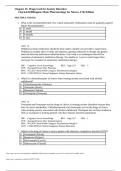
-
Chapter 15: Drugs Used for Anxiety DisordersClayton/Willihnganz: Basic Pharmacology for Nurses, 17th Edition
- Exam (elaborations) • 8 pages • 2023
- Available in package deal
-
- $8.49
- + learn more
1. What is the recommended time over which antianxiety medications must be gradually tapered before discontinuation? a. 1 week b. 1 month c. 6 months d. 1 year ANS: B Withdrawal from medication should be done under a health care provider’s supervision. Withdrawal usually takes 4 weeks and requires a gradual reduction in dosage and greater intervals between medication administrations. One week is an inadequate interval for cessation of antianxiety medication therapy. Six months to 1 y...
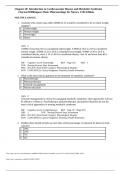
-
Chapter 20: Introduction to Cardiovascular Disease and Metabolic Syndrome Clayton/Willihnganz: Basic Pharmacology for Nurses, 17th Edition
- Exam (elaborations) • 6 pages • 2023
- Available in package deal
-
- $9.49
- + learn more
1. A patient with a body mass index (BMI) of 25 would be considered to be in which weight category? a. Underweight b. Normal weight c. Overweight d. Obese ANS: C A BMI of less than 18.5 is considered underweight. A BMI of 18.5 to 24.9 is considered normal weight. A BMI of 25 to 29.9 is considered overweight. A BMI of 30 to 34.9 is considered obesity, class I; 35 to 39.9 is considered obesity, class II; and more than 40 is considered extreme obesity. DIF: Cognitive Level: Knowledge REF...
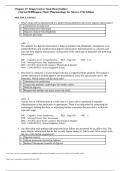
-
Chapter 27: Drugs Used to Treat Heart Failure Clayton/Willihnganz: Basic Pharmacology for Nurses, 17th Edition questions with 100% correct answers Download for an A+
- Exam (elaborations) • 9 pages • 2023
- Available in package deal
-
- $8.49
- + learn more
1. Which drug will be administered to a patient being admitted with severe digoxin intoxication? a. Amiodarone (Cordarone) b. Spironolactone (Aldactone) c. Digoxin immune Fab (Digibind) d. Digitalis glycoside ANS: C The antidote for digoxin intoxication is digoxin immune Fab (Digibind). Amiodarone is an antidysrhythmic and would not treat digoxin intoxication. Spironolactone is a diuretic and does not treat digoxin intoxication. Giving more of the same type of drug does not treat drug i...
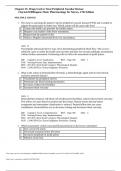
-
Chapter 25: Drugs Used to Treat Peripheral Vascular Disease Clayton/Willihnganz: Basic Pharmacology for Nurses, 17th Edition
- Exam (elaborations) • 6 pages • 2023
- Available in package deal
-
- $8.49
- + learn more
1. The nurse is assessing the patient’s leg for peripheral vascular disease (PVD) and is unable to palpate the pedal pulse in either foot. Which action will the nurse take first? a. Contact the health care provider for further orders. b. Request x-ray studies of the lower extremities. c. Request that the patient lie flat. d. Obtain a Doppler ultrasound device for auscultation. ANS: D The Doppler ultrasound device may aid in determining peripheral blood flow. This is not a sufficient ca...
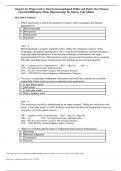
-
Chapter 32: Drugs Used to Treat Gastroesophageal Reflux and Peptic Ulcer Disease Clayton/Willihnganz: Basic Pharmacology for Nurses, 17th Edition
- Exam (elaborations) • 9 pages • 2023
- Available in package deal
-
- $8.49
- + learn more
1. Which medication is used in the treatment of gastric reflux esophagitis and diabetic gastroparesis? a. Metoclopramide b. Misoprostol c. Pantoprazole d. Ranitidine ANS: A Metoclopramide is a gastric stimulant used to relieve the symptoms of gastric reflux esophagitis and diabetic gastroparesis, aid in small bowel intubation, and stimulate gastric emptying and intestinal transit of barium after radiologic examination of the upper gastrointestinal (GI) tract. Misoprostol is used to pre...
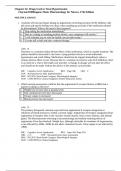
-
Chapter 22: Drugs Used to Treat Hypertension Clayton/Willihnganz: Basic Pharmacology for Nurses, 17th Edition
- Exam (elaborations) • 11 pages • 2023
- Available in package deal
-
- $9.49
- + learn more
1. A patient who has just begun taking an angiotensin converting enzyme (ACE) inhibitor calls the nurse and reports feeling very dizzy when standing up and asks if the medication should be discontinued. What is the nurse’s best response? a. “Stop taking the medication immediately.” b. “Rise to a sitting or standing position slowly; your symptoms will resolve.” c. “I will schedule you to visit the health care provider today.” d. “Cut the pill in half and take a reduced dosag...
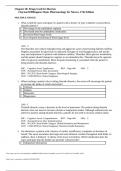
-
Chapter 28: Drugs Used for Diuresis Clayton/Willihnganz: Basic Pharmacology for Nurses, 17th Edition questions with 100% correct answers Download for an A+
- Exam (elaborations) • 9 pages • 2023
- Available in package deal
-
- $8.49
- + learn more
1. What would the nurse anticipate if a patient with a history of type 2 diabetes is prescribed a thiazide diuretic? a. No change in the antidiabetic regimen b. Decreased need for antidiabetic medication c. Increased blood sugar levels d. Less frequent monitoring of blood sugar level ANS: C The thiazides may induce hyperglycemia and aggravate cases of preexisting diabetes mellitus. Regular assessment for glycosuria is indicated. Dosages of oral hypoglycemics and insulin may need adjustm...

How much did you already spend on Stuvia? Imagine there are plenty more of you out there paying for study notes, but this time YOU are the seller. Ka-ching! Discover all about earning on Stuvia


